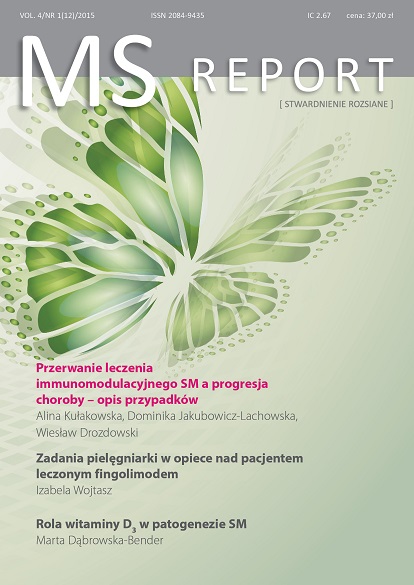Discontinuation of immunomodulatory treatment in multiple sclerosis and disease progression – case reports Case report
Main Article Content
Abstract
Multiple sclerosis (MS) is a chronic, inflammatory and degenerative disease of the central nervous system, with still unknown etiology. Drugs that have been used for approximately 20 years, including first registered interferon β1b, favorably modify the natural course of relapsing-remitting MS. The registration of interferon β preparations was preceded by 24-month multicenter randomized double-blind clinical trials. Only when these drugs were implemented in outpatient healthcare, long-term sequels of the therapy, both in terms of its efficacy and safety, could be observed. The long-term follow-up has allowed the hypothesis that interferon therapy should be continued as long as it is effective and has no side effects. This is also in accordance with the guidelines for first line treatment in MS recommended by National Health Fund in our country. We present two cases of female patients who experienced pronounced relapse of MS shortly after discontinuation of long-term effective treatment with interferon β.
Article Details
Copyright © by Medical Education. All rights reserved.
References
2. Berkowicz T.: Skuteczność różnych preparatów interferonu beta w stwardnieniu rozsianym. Przegląd otwartych badań porównawczych. Neuropsychiatria i Neuropsychologia 2012; 7(4): 175-180.
3. Podlecka-Piętowska A.: Standardy diagnostyki i leczenia stwardnienia rozsianego. Neurologia po Dyplomie 2011 – Zeszyt Edukacyjny. Standardy diagnostyki i leczenia chorób demielinizacyjno-zapalnych układu nerwowego: 3-13.
4. Dziennik Urzędowy Ministra Zdrowia, Warszawa, 25 czerwca 2014 r., poz. 56. Obwieszczenie Ministra Zdrowia z 24 czerwca 2014 r. w sprawie wykazu refundowanych leków, środków spożywczych specjalnego przeznaczenia żywieniowego oraz wyrobów medycznych. Załącznik B2.
5. Kurtzke J.F.: Rating neurological impairment in multiple sclerosis; an expanded disability status scale (EDSS). Neurology 1983; 33: 1444-1452.
6. The IFNB Multiple Sclerosis Study Group. Interferon beta-1b is effective in relapsing-re: mitting multiple sclerosis. I. Clinical results of a multicenter, randomized, double-blind, placebo-controlled trial. Neurology 1993; 43: 655-661.
7. Chapel H., Haeney M., Misbah S.et al.: Immunoterapia. Immunologia Kliniczna. Wydawnictwo Czelej, Lublin 2009: 135-160.
8. Gołąb J., Jakóbisiak M.: Cytokiny. Immunologia. Wydawnictwo Naukowe PWN, Warszawa 2007: 108-152.
9. PRISMS Study Group: Randomised double-blind placebo-controlled study of interferon beta-1a in relapsing/remitting multiple sclerosis. Lancet 1998; 352: 1498-1504.
10. Jacobs L.D., Cookfair D.L., Rudick R.A. et al.: Intramuscular interferon beta-1a for disease progression in relapsing multiple sclerosis. Ann. Neurol. 1996; 39: 285-294.
11. Bermel R.A., Weinstock-Guttman B., Bourdette D. et al.: Intramuscular interferon beta-1a therapy in patients with relapsing-remitting multiple sclerosis: a 15-year follow-up study. Mult. Scler. 2010; 16: 588-596.
12. Kappos L., Traboulsee A., Constantinescu C. et al.: Long-term subcutaneous interferon beta-1a therapy in patients with relapsing-remitting MS. Neurology 2006; 67: 944-953.
13. Goodin D.S., Jones J., Li D. et al.; 16-Year Long-Term Follow-up Study Investigators: Establishing long-term efficacy in chronic disease: use of recursive partitioning and propensity score adjustment to estimate outcome in MS. PLoS One 2011; 6: e22444.
14. Sejbuk-Rozbicka K., Kuzawińska O., Zaremba A. et al.: Zasady rejestracji i refundacji produktów leczniczych stosowanych w leczeniu stwardnienia rozsianego w Polsce. MS Report 2014; 3(2): 10-15.

